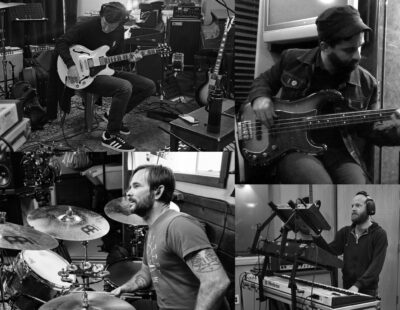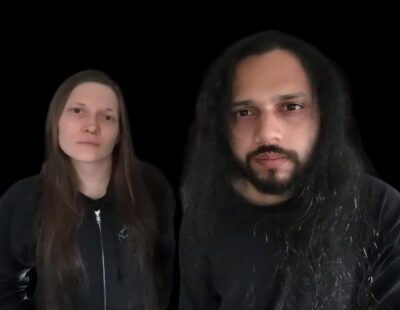** Valkyrja has largely existed in a vacuum of uncool. The Swedes’ brand of fiery black is likened to Watain fucking around with early period Enslaved, but that’s the extent of Valkyrja’s Satan-powered volcano. Throughout the group’s three-album discography they tap an unknown darkness. They make you feel as if you’ve stuck your head and heart into the abyss. Valkyrja’s latest album, The Antagonist’s Fire, is a genuine and personal journey into inner recesses of evil, where existentialism and nihilism meet in a grimy, blood-and-dreams soaked pit. Black metal reigns supreme with Valkyra!
What’s been happening over the last three years in Valkyrja?
Simon Wizén: After the release of Contamination we focused on increasing the—at the time—quite scarce amount of live performances made. Two tours and several of other performances followed in ’10 and ’11. During the summer of [last] year we record the third album, namely The Antagonist’s Fire, a work that has been growing on us since the birth of Contamination
These two phrases “As always – determined to reach further, ascending higher and descending even deeper. As always – prepared to announce the discontinuation of Valkyrja if all past deeds could not be exceeded.” were on your Facebook. What do they mean?
Simon Wizén: Lay to waste every restriction. If you stick to the same formulae again and again, what do you possibly have to channel? If your only goal is to create a catchy melody for others to cherish, demonstrate your technical ability, or in any other way use the audio tool for a shallow reason without content, what is the actual point of investing time? Evolve or be gone, have something to display through this medium or stop interrupting. Look at your festival poster of choice, I bet you can easily spot ten bands that have lost their spark and simply run on routine, past success and the fame of the now-gone glory days. If you have nothing to say, close your mouth. How simple it might sound, I can’t underline this enough.
Do you think you’ve come out of silence/hardship a stronger unit?
Simon Wizén: Every experience, good or bad, strengthens us as a unit. Difficulties require a solution, which in the end comes out as a valuable experience. Without hardship, what could you possibly learn about yourself? The struggle sharpens the blades.
Did you approach The Antagonist’s Fire differently from Contamination?
Simon Wizén: For the Contamination recording, we had a longer studio session to rely on. This time we had to cut it down, which forced us for greater preparations. We did a full preproduction, which allowed us to get a better grip of what we the overall picture and what details to focus on. I’m equally satisfied with both albums since we pushed them to the limits-at-the-time, and with that in mind I’m secure they will stand the test of time. If they will to others, I can’t say, but if one can’t recognize the great labor put into the own effort, they don’t deserve to be recognized.
I feel The Antagonist’s Fire is more direct than Contamination. Any truth to that statement?
Simon Wizén: We never wanted to do a pure ‘follow up’. We wanted to evolve and use new tools and elements. Sticking to a secure blueprint was never an option. The core is quite similar, as the fruit of all our work are plucked from the same tree, but I see different strengths and approaches in these two albums. If the last one is more ‘direct’ I really can’t answer. It’s a matter of opinion. I don’t share it myself, but that doesn’t make you incorrect. If you ask me, I find the material more raw and furious, more straight-forward and stripped down, but at times channeled through more melodic and/or melancholic parts, which I guess enhance and lift the atmosphere.
The singles we released on Decibel’s blog were received very well. What did you make of peoples’ first-time impressions of your music?
Simon Wizén: Before the album was announced, we had the final result recorded and completed, thus we already knew what to make of it. From what little I know regarding the previews, they received mainly positive critique. On the other hand, these two are only two voices of the overall picture and I guess they will make even more sense when heard in the full context.
Lyrically, what’s happening on The Antagonist’s Fire? Who is the Antagonist? Me, you, Satan?
Simon Wizén: The Antagonist in this case is the opposer of all that defines man, the world, life, laws and every restriction that comes with these shackles. The manifested force of perdition and undisturbed silence.
What do you make of the evils of the world at the moment? Lots of unrest, violence, and tribe-like behavior. Maybe death and destruction will always be part of the human condition.
Simon Wizén: I suppose most of the conflicts are collisions in the political and cultural fields. I don’t care about their wars, actions or rat race to reach the top of the pyramid. Their struggle for leadership is effortless anyhow, as sheep aren’t meant to lead. The wheels of claiming the position as the leader will most likely keep turning until the end of days, it’s in the human nature to conquer. One must understand – mankind has the amazing ability to overrate what we truly are. We are but animals who claimed our own superiority by reducing all other species in our surrounding, hence placing ourselves as the elite. When this meaningless globe is burnt to powder, so is man and all our past ‘achievements’. There is only one solution to our problems, and that is extinction, as we are the problem in the very core. Cattle are meant to slaughtered, keep that in mind.
What’s happening on the cover?
Simon Wizén: The message of the front is pretty clear if you look at the album title and the content of the lyrics. Displayed here is the manifestation of Death, the state of complete nothing. His fires symbolize the many ways through which he works, without limitations and barriers of the worldly. This is a red line, spanning through everything we’ve done, released and channeled since our formation, but in a more ‘obvious’ illustration. It’s actually quite representative for Valkyrja as a unit, in summary. The smoke takes forms as serpents, which should speak even clearer to the observant. A suggestion is to approach everything at the same time, not dissection the audio, lyrics and illustrations alone. They complement and enhance each other for the good of the greater picture.
You moved from Metal Blade to W.T.C. Why the change?
Simon Wizén: We had already been collaborating with W.T.C as they released the vinyl edition of Contamination in ‘12. After all, it was a more suitable label for us, mainly for their understanding of our kind of audio and their interest in our work. I’m satisfied to say we are not stuck in the regular label/band-relationship, but more of a unity in which we aim to reach the same result.
How do you think the way bands operate has changed in the last 10 years? More DIY these days, for sure.
Simon Wizén: We haven’t been around long enough to notice a bigger change. I have the feeling the standard was higher, taken from the thin air though, as anyone nowadays can buy cheap studio equipment, record another Transilvanian Hunger clone, get a friend to release their stuff and call themselves signed. Take a look at the majority of distribution sites, the amount of effortless nonsense filling their space is vast, which makes the whole industry quite fuzzy. Sadly, too few have reached the conclusion that there is no need for additional clones of Darkthrone, Blasphemy, Beherit or their likes. The originals will always outdo their followers anyhow. It’s a simple fact. We never surrendered to the easy way out, nor allowed something to be done for the sake alone. If more time and effort was needed to fully complete a work, nothing was allowed to interfere with the process and rush the result.
What do you make of the current state of black metal? Where does Valkyrja sit in that?
Simon Wizén: The world of black metal is quite dormant right now. There’s always another trend in bloom among us, like the seemingly never-to-end retro garbage, to keep the lowlifes busy. On the other hand, these weak-minded cunts will always seek the next shallow thrill, so let’s find joy in the fact that they pollute something I’m not involved in. As a result, it seems like the genre is taken more serious, compared to some years ago when everyone had an active ‘black metal’ band— whether you were serious with your work or had this project alongside your power- pagan-viking-or similar worthless-metal band. The criterions were face paint and a heavily limited rehearsal tape. I don’t really follow the genre when it comes to new acts, thus I could be wrong, but having idiots of Stockholm around, the judgment might get clouded. Of course I’m speaking generally; there have been some acts that caught my attention for more than one reason—Fides Inversa and Ascension, for example. There are some more great ones out there, but that’s enough namedropping. Great artists don’t need this kind of promotion as their work will surely speak for itself, for those who take the time of discovering it—yet it couldn’t hurt mentioning the superior work made by these two classics-to-come. Support unto those who surely deserve it.
** Valkyrja’s The Antagonist’s Fire is out now through W.T.C. Productions. It’s available HERE for the firebrands, the darkness appreciators, and the sanguine among us.






